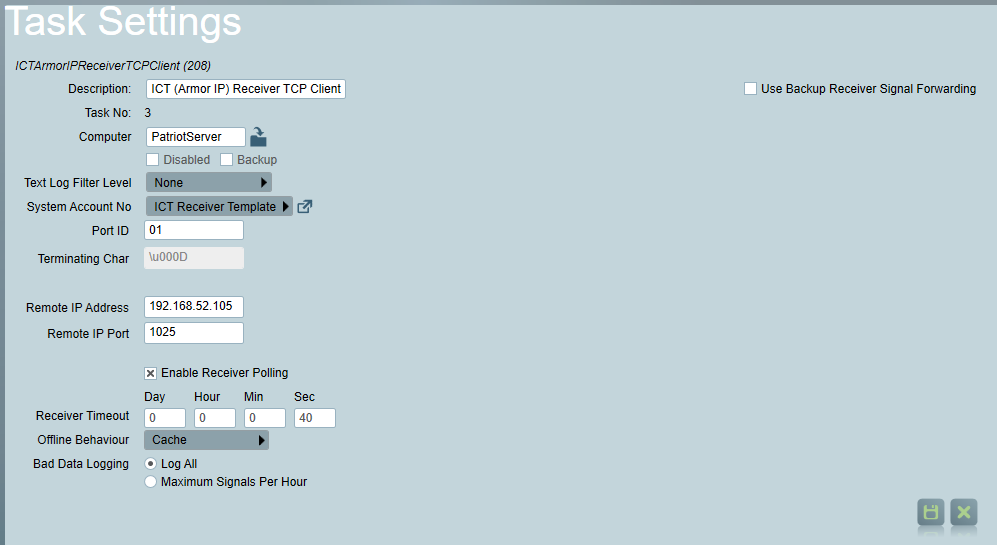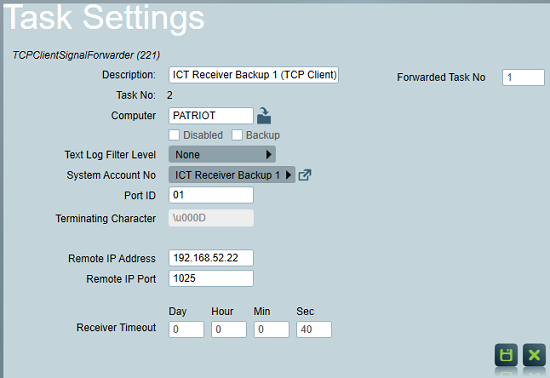ICT Receiver (Armor IP) Task
This document details the preferred method for connecting Patriot to ICT PostX Modules, Protege alarm panels and related devices which support the ICT Armor IP protocol. ICT produces a software alarm receiver package that can handle communication with the remote alarm panels or modules, and then connect them to this Patriot receiver task.
There is an alternative method of connecting Patriot to these alarm panels. Patriot can be configured to receive IP connections directly from the remote alarm panels via the ICT Armor IP task without need of installing the ICT alarm receiver software package. This alternate method is no longer recommended for most users.
Receivers Supported by this Task:
- Armor IP Receiver
Protocols Supported:
- Ademco685 XML protocol
Prerequisites
- The ICT Armor IP module must be registered
- ICT Armor IP receiver software should be installed and accessible via secure LAN or Serial to Patriot server.
Receiver Settings
Please refer to individual receiver documentation for detailed configuration information. The receiver must be set up with a static IP address. This will typically be connected on the same local network as the automation receiver. The automation format must be configured to use Ademco685 XML format.
Task Setup
System Menu Item > Tasks > Task Settings
Please read Task Settings for general information about receiver task configuration.
There are three variations on the ICT Receiver task named according to the communication method:
- ICT (Armor IP) Receiver TCP Client (recommended)
- ICT (Armor IP) Receiver TCP Server
- ICT (Armor IP) Receiver Serial

Task Settings
Offline Behaviour: This defines the behaviour the task should have when the Patriot Data Service is offline (or unreachable). The default behaviour for all Patriot tasks is "Cache". The "Ignore" behaviour is also available for the ICT Receiver task. Refer to the Offline Behaviour section of the Task Settings documentation before changing this setting.
Backup Receiver(s)
If you choose the preferred TCP Client variation of the ICT Receiver task, you will see an extra task option Use Backup Receiver Signal Forwarding in addition to the general receiver communications settings.
The purpose of this option is to prevent unnecessary polling failure & restore signals being logged against your client accounts when multiple ICT Receivers (primary receiver and one or more backups) are in use together.
This can happen because the ICT Receiver software is unaware when multiple receivers are in use together, and therefore when an alarm panel switches its connection between two receivers, the first receiver will see this as a polling failure and the second receiver as a polling restore. By enabling this task option and then setting a non-zero Poll Failure Delay in seconds, Patriot will prevent these unnecessary signals from being logged by delaying polling failure & restore signals and then ignoring them if an opposing polling restore or failure signal is received from a different receiver within the short delay period.
For this option to work as described, backup ICT Receivers must be connected to Patriot via instances of the TCP Client Signal Forwarding task which should be configured to forward signals to your primary ICT Receiver task.
If the 'Use Backup Receiver Signal Forwarding' option is used in combination with Offline Behaviour set to Ignore, any signal which is delayed (poll fails and restores) will be acknowledged immediately when received, and not when logged to the database (potentially delayed).
